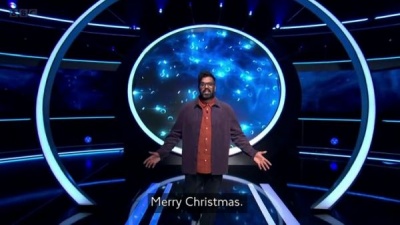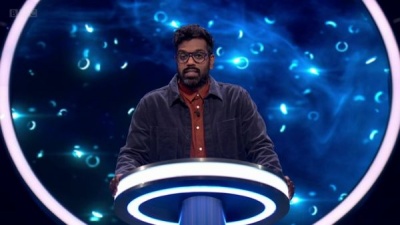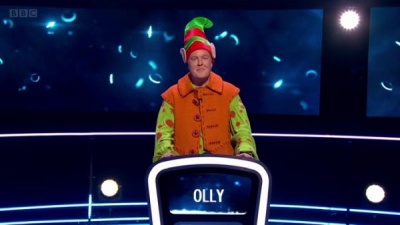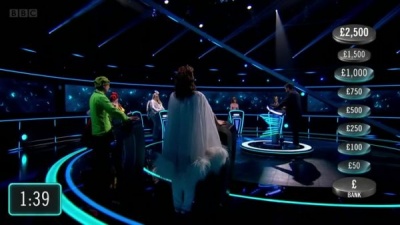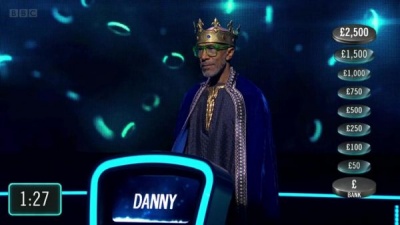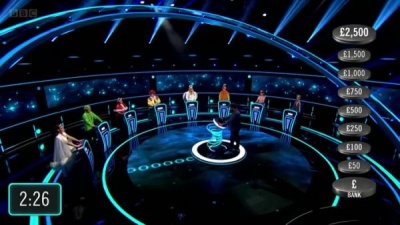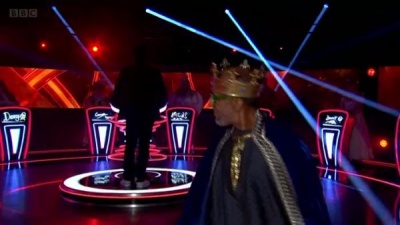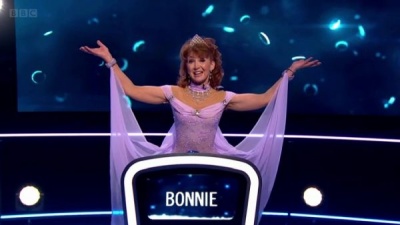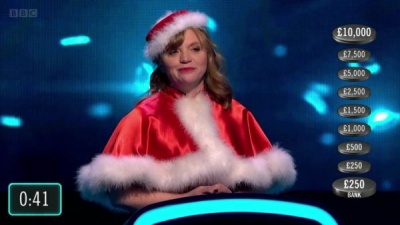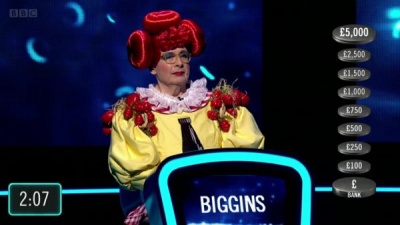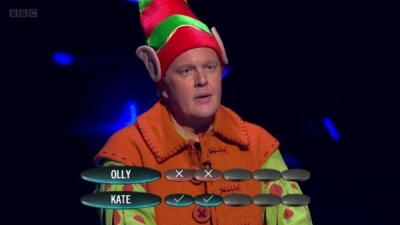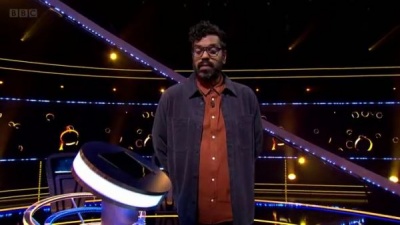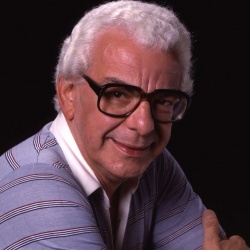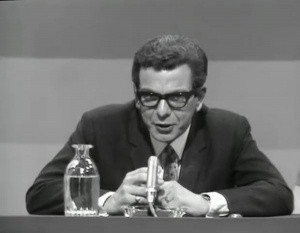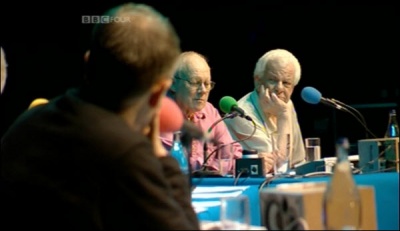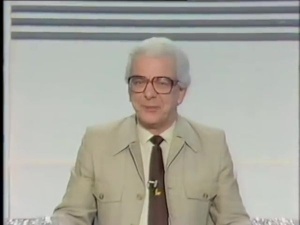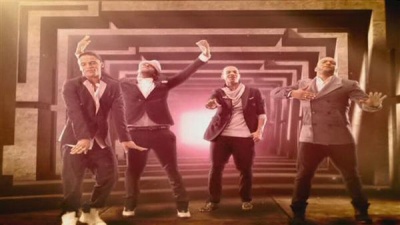Weaver's Week 2022-02-06
Last week | Weaver's Week Index | Next week
In the beginning was the word. And the word was, "Welcome! To The Weakest Link."
But times change, and in the latest translation, the word is
Contents |
The Weakest Link
BBC Studios Entertainment Productions for BBC1, from 18 December
For a show that hasn't been on air for nearly a decade, we've written a lot about The Weakest Link. In 2012, we marked the end of the original series by remembering those heady days when it was new. In 2017, we saw a ponderous revival for charity.
In 2020, NBC brought back the title, and most of the game, but broke the final round while unpacking the show. They hoped nobody would notice. We noticed, and we disliked it.
And now, BBC1 brings the programme back. There's a new host, Romesh Ranganathan. He's unlike the previous host, Anne Robinson, on the grounds that he's a) funny, b) wears smart casual clothes, and c) sounds like he means it when he says "Welcome to The Weakest Link."
The basic rules are as constant as the speed of light. Form a chain of correct answers to reach the target figure. An incorrect answer loses all the money in the chain. You can bank the money on the chain before hearing a question; this starts a fresh chain from zero. Only money banked before time runs out goes into the prize pot. After each round, the players vote to remove one player: whoever gets the most votes is eliminated.
One novelty's been retained from the NBC version: contestants are asked to push a button as they bank the money. Assuming the buttons do something, it helps to avoid any disputes about whether the bank was in time. Another novelty of theirs, questions appearing on screen, hasn't survived the harrumphing of customs officers.
Very quickly, we hear that the show's tone has changed. "I'm blown away, you look incredible," says Romesh. He's complimenting the contestants before they've done anything. Romesh is putting them at their ease. Encouraging them to do well. This ain't your parent's The Weakest Link, this is the new version.
Either that, or he's lulling 'em into a false sense of security. Psychological games, thinking smarter than the players. Romesh can do that, he's clever and experienced, and he's got all the answers on his pedestal.
And so we begin, with a round of very easy questions. Still lulling the players into a false sense of security, by giving them the very real security of £2500 in the pot – if they're awake enough to take it.
After the round, whether it results in success or failure, someone's got to go. Romesh throws out his scripted lines. "Who thinks Deck The Halls is Ant McPartlin's mate? Who tried to return the ghost of Christmas present?" Hang on, some of these are actually funny lines. And they make us laugh. And they leave the laugh in the edit. Romesh is being funny. The old host couldn't deliver a joke into a box with a ten-foot neon sign saying "JOKE HERE!" Romesh can. This ain't your parent's The Weakest Link, this is the new version.
Voiceover is by Julie Hesmondhalgh, who you might know from Broadchurch, Coronation Street, or as the narrator for shows like Celebrity Craft Masters. She has a distinct voice, northern and earthy and a bit snarky. Clearly and obviously very different from the host, in a way NBC flubbed by drafting in a Jane Lynch-soundalike for their voiceover.
There is banter, the host discusses what happened in the round with the players. Some of the conversations are edited in, others fall by the studio wayside. Would be interesting to have a crossover between The Weakest Link and I Literally Just Told You, but that's another idea.
Eventually, it reaches the conclusion. "With three votes, you are the weakest link. Goodbye." The player walks off set, we might hear some friendly cheerios from the rest of the team. There's still a regretful piece to camera, disguising the cut as the player walks off down a tunnel.
And then we are seven, and the game continues, cycles, moves on. Ten seconds off the clock, and we play again. For the third round, something different: they're upping the stakes. Another ten seconds off the clock, but the prize chain increases.
So we're going to have to talk about money. And use numbers. Specifically, the chains they've got in the game. The original chain had three rules: 1) As many steps as there are players in the game. 2) First answer is worth 2% of the target. 3) Four correct answers are worth 20% of the target. When applied to the eight-player celeb game, the chain became 50-100-200-500-1000-1500-2000-2500 .
NBC's revival didn't follow these rules, and suffered as a result. Like Moneybags and Moneyball, NBC's Link waved huge amounts of money and never seriously thought about giving it away.
The BBC's revival? Different: 50-100-250-500-750-1000-1500-2500. Follows the rules, with a clear signal to bank after four questions because it stops doubling there, and you're risking more for less reward. But you could press on, because the first round questions are so easy even Christopher Biggins could get them right.
Rounds three and four: 100-250-500-750-1000-1500-2500-5000. Quick quick slow crawl slow quick quick. Doesn't follow the rules, they need to delete £750 and put in a £3500 link. The obvious strategy is to bank after two answers.
Rounds five and six: 250-500-750-1000-1500-2500-5000-7500. They're not even trying now, are they? One answer is too high (should be £150), four is too low (should be £1500 not £1000). Might as well bank after every question, which is probably the way the producers want the game to go.
We criticised NBC's revival for many things, but one took the biscuit. They did away with the final round, and therefore completely and utterly broke the game. They went straight from the three-player vote to the grand final. What possible reason is there not to vote off the best player? With a two-player cash round, you might want to keep your best opponent, profit from their excellence, and hope they stumble in the final gifting you a few grand more. Without that final cash round, it's obviously best to ditch your best opponent.
The BBC have the good sense to keep the game intact, and play a final round. Though it's shown on screen as for £10,000, all values are doubled, so the actual rewards are 500-1000-2000-3000-5000-10k-15k-20k. We'll let them get away with generosity (£400 is an awkward first step), but £5000 is still a link too late.
Enough numbers? Enough numbers! Let's talk about how the show looks, because it's not as clear as it should be. The chain is shown on the right-hand side of the screen, whiteish text in grey ovals. The position on the chain is marked by whiteish text in teal ovals, and the top of the chain is ever so slightly bigger.
At a glance, we find it difficult to tell whereabouts we are on the chain. We have to stop and look, and distinguish the ovals from the set backdrop in a similar green-blue hue. NBC got this right, a single gold oval looks good on screen. We don't have all the questions written out as captions – BBC1 viewers are expected to know where the "Subtitles" button is on the remote control. And of course players can interrupt: this isn't Mastermind.
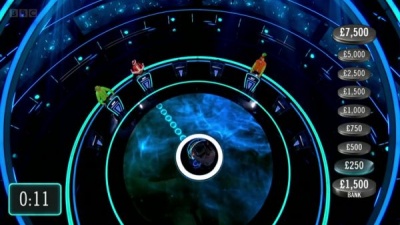 Too difficult to see where we are in the chain. This is literally our one problem with the show, and it's piffling.
Too difficult to see where we are in the chain. This is literally our one problem with the show, and it's piffling.
Other than that graphics problem, the presentation is fine. Captions are legible – though the players doodle too much on their computer pads. Time remains on the screen throughout, there are occasional picture questions. And they've kept Paul Farrer's music, we hesitate to describe any sound as "iconic", but it's certainly got one of the most recognisable stabs.
How fast does Romesh go? Assuming the contestants don't dawdle too much, Romesh will ask about 100 questions in the main game, plus 6 questions of "who is the Weakest Link?" The final will add between 6 and 12 questions, and it's all done in a 45 minute slot. The pace is about 2.4 questions per minute, or 58% of the pace of Channel 5's no-frills 100%.
The biggest difference between Anne Robinson's The Weakest Link and Romesh Ranganathan's is the style. Anne was always a neutral-evil character, actively wanted to be disliked, and forced the show along her tune. Romesh is asking questions, he is a lawful-neutral character. Doesn't care who wins, prepared to go with the flow of the show.
And in that freedom, we get all sorts of influences. The free-spirited bonhomie of The Wheel. The gentle celebration of Only Connect. Romesh isn't there to dredge up some stereotype vaguely related to the player's past, he works only with what we've seen on the show.
This ain't your parents' The Weakest Link, this is the new version. It's the right version for the early '20s, praise where it can and scorn where it's merited, adding to the value of both reactions. The quiz remains pitched at the right level, getting harder as the show goes on, and adding more money for harder questions is an idea so obvious in retrospect.
Don't expect Romesh's Link to run every day, it isn't going to elbow Pointless out at teatime. Do expect a dozen episodes every winter, something cheap and sustainable to pleasantly fill a shoulder-prime slot.
And whatever you do, don't be the weakest link.
Barry Cryer
It's hard to imagine a world without Barry Cryer. We have to go deep into pre-history: to 23 March 1935, when Leeds natives Jean and John Cryer {1} found themselves the parents of a son. Barry was educated at Leeds Grammar School, then read English Literature for a year at Leeds University before dropping out. Always a natural entertainer, he was given a week's work at Leeds City Varieties Theatre.
By this later date, they'd built roads out of Leeds, and Barry moved to London. He hoped that his sparkling wit and general bonhomie would count for something – more than his complete lack of experience.
"The newspaper headline after Queen Elizabeth dismissed Walter Raleigh: Goodbye, Mr Chips."
Sparkling wit and general pleasantness proved enough for Barry to get a job at the foot of the bill at the Windmill theatre. He filled time between the dancing girls, a thankless task because the punters are only here for two things, neither of them one-liners delivered by a young lad from Leeds. Barry played in the West End, in the smash show Expresso Bongo, and recorded a version of the song "Purple people eater" – it gave him a number one single in Finland.
But writing would prove to be Barry Cryer's forte. He started writing for Danny La Rue, a drag star of the era, who introduced Barry to David Frost. That turned into a job writing on The Frost Report, and then Frost on LWT. He wrote for Morecambe and Wise, he wrote and performed on the radio show Hello Cheeky.
The car mechanics' motto: Piston broke? We can help!
And he was the second host of I'm Sorry I Haven't a Clue. The freeform antidote to panel games had some early instalment weirdness (not least of which was a semi-serious attempt to keep score). Half of the first series was hosted by Barry Cryer, the other half featured him on the panel. He'd remain on the ISIHAC panel until 2021, unable to be moved by anything short of death.
One round requires teams to play "radio charades", during which Barry and Graeme Garden often adopted the Scottish characters Hamish and Dougal. Over the years, these sketches grew into full characters, and a series of their own You'll Have Had Your Tea.
"The online auction site for glue: Ebay gum."
Barry Cryer wrote lots of comedy. Over fifty shows with Graham Chapman, he worked a lot with Kenny Everett (a latter-day Danny La Rue), and The Two Ronnies. And many, many, many more. If you worked in comedy during the last fifty years, you worked with Barry Cryer.
The secret of his success: Barry always stayed up to date. He was hugely enthusiastic about successive generations of comedians, encouraging and laughing with the likes of Linda Smith and Sean Lock. Often, he'd call people on the telephone, with that raspy laugh, have a chat and a giggle, and leave the person on the other end of the phone smiling for the rest of the day.
Biblical chat-up lines: "Get your fig-leaf, you've pulled."
Barry married his wife Terry in 1962; they had four children together. With his son Bob, Barry had started a series of podcasts retelling stories from his showbiz career. He'd also made Comedy Legends for Sky's Artsworld channel, profiling 40 superb comedians. Such was his trademark reverence and humility that Barry would never admit to deserving a show of his own.
Almost inevitably, Barry Cryer appeared in panel games, from Whose Baby? to Pointless Celebrities. He was always a welcome guest on Punchlines, proved reliable on I've Got a Secret, and enlivened Blankety Blank. When he played Celebrity Fifteen-to-One, they had to invent a Barry Cryer rule so he would stay after getting two wrong in the first round.
Barry could also host shows. ITV's comedy quiz Joker's Wild, where comedians interrupted each other's shaggy dog stories. Television nostalgia quiz Those Wonderful TV Times, the first few series of Crosswits. And Barry helmed forgotten daytime filler Music Match – think of the music round from Only Connect spun out into a half-hour programme, with the live band from House of Games Night, and you're there.
Barry Cryer was 86 when he died last week. We'll give you your day back.
{1} Some obituaries listed Barry's father as Carl, others as John.
In other news
ITV2 has confirmed its new schedule. Similar to the old schedule, with Celebrity Juice, Celebrity Karaoke Club, Apocalypse Wow, and Love Island all due to return in the coming year.
Quizzy Mondays: Edinburgh all over Trinity Cambridge by 230-95. Martin McCann won Mastermind answering on La Vuelta a España; he won by a pass, with three points covering all contenders.
Inspired by a discussion on Royal Flush's One With Absolutely Everything last week, we're going to pick out a great question from time to time, and explain why it's so good. This week's example comes from University Challenge:
Q: Taken in order, the letters representing total, orbital, and spin angular momentum values in atoms spell out the name of which band, whose 2009 debut single was "Beat Again"?
Two ways of attacking this question. If you're a university-level physicist, or have covered spectroscopy elsewhere, you'll remember that spin angular momentum is represented by S, orbital from the other end by L, and the total by (er) J. Or if you were into pop culture about ten years ago, as the teams might well have been, you'll remember the song and who made it.
Either way, the juxtaposition of subatomic particulates and The JLS is sure to raise a smile, and that's always a good thing to do.
By coincidence, we see that Paul Sinha is to record Perfect Pub Quiz Night for Radio 4 at the end of the month, where he'll dissect listener's quiz questions and improve them. Tickets, if you're in London.
A new episode of TV Show and Telly? We're spoiled! This column had never encountered Nick Uhas before hearing him talk with Justin and David; it's an intriguing tale he tells.
On your telly: Celebrity Big Brother Australia (E4, from Sun). The Fast and the Farmer-ish (BBC3, Wed) looks like it'll do for agriculture what Fferm Ffactor did for car keys. Unforgivable is back (Dave, Tue).
Two new shows for younger viewers. Best Young Artist (CBBC, from Mon) with Rickie Wilson and Vick Hope. A fantasy series is always intriguing, Gwrach y Rhibyn (S4C, Fri) gives us strong Raven vibes.
Next Saturday: Ruthie Henshall and Rufus Hound on Celebrity Mastermind (BBC1), Kaye Adams and Linda Robson on The Weakest Link, civilian episodes of The Wall resume, and ITV promise to be Starstruck.
Pictures: BBC Studios Entertainment, Yorkshire TV, BBC, Syco / ITV Studios.
To have Weaver's Week emailed to you on publication day, receive our exclusive TV roundup of the game shows in the week ahead, and chat to other ukgameshows.com readers, sign up to our Google Group.

